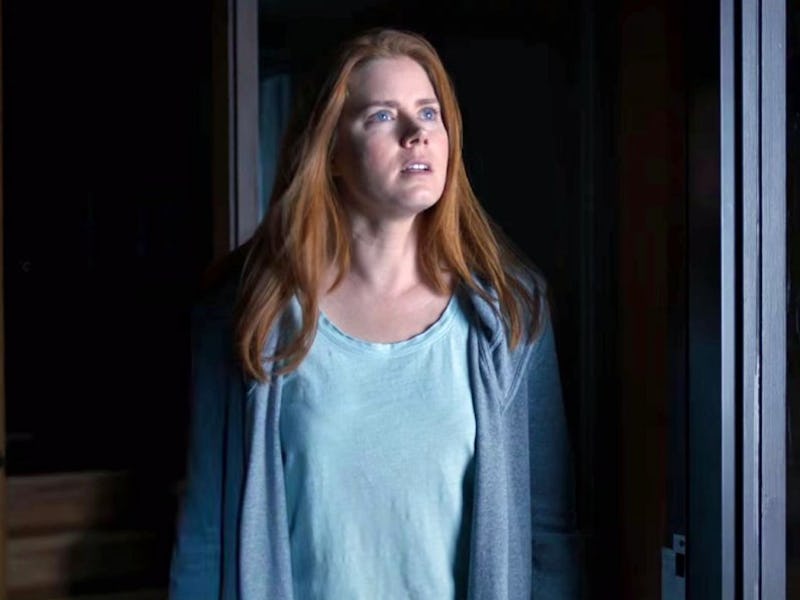The Exploration of Time in 'Arrival' Will Blow Your Mind
The 'Arrival' aliens come from a proud sci-fi tradition.

The rare serious science fiction film, Arrival explores the near impossible task of presenting a feasible depiction of first contact with true aliens from another planet. But it also sneaks in another sci-fi premise too: the kind of time travel that takes place in your mind.
Note: This post has spoilers
Toward the end of the film, linguist Dr. Louise Banks (Amy Adams) realizes that one of the biggest stumbling blocks to communicating with the many-tentacled Heptapod aliens is the fact that they think about the “passage” of time completely differently than she does. In fact, the Heptapods basically see through time, since they don’t believe the concept of linear time exists. In the end, the justification for why everything happens in Arrival hinges on this notion. And it probably works so well in the film because it’s a classic and thoughtful science fiction premise. Sure, Arrival is based on a science fiction short story called “The Story of Your Life” by Ted Chiang, but the idea of “timeless” space aliens predates the story and the new film. In fact, aliens with very similar philosophies can be found in Kurt Vonnegut’s most well-known novel, as well as the first episode of Star Trek: Deep Space Nine.
Famously, the second chapter of Kurt Vonnegut’s book Slaughterhouse-Five tells the reader that “Billy Pilgrim has come unstuck in time.” From there, much like Louise in Arrival, Billy Pilgrim experiences certain memories in his life out of order. In the book, Billy hangs out with aliens called the Tralfamadorians, creatures who see time as an “illusion.” As Vonnegut writes: “When a Tralfamadorian sees a corpse, all he thinks he thinks is that the dead person is in a bad condition at that particular moment, but that the same person is fine in plenty of other moments.” Throughout the book, it’s revealed Billy’s time-skipping isn’t the direct influence of the Tralfamadorians, but that “they were simply able to give him insights into what was really going on.”
This idea is almost identical to what happens to Louise in Arrival. By giving Louise the “gift” of seeing time differently, the Heptapods are able to communicate effectively to her, and thus prevent a worldwide meltdown. In Slaughterhouse-Five the stakes are probably a bit lower: Billy Pilgrim’s sanity is questioned, but the concept rings similar enough to the extent that you could consider the Heptapods something of a tribute to the Tralfamadorians.
But the most famous science fiction franchise of them all, Star Trek, also dealt with non-linear aliens assisting a human with notions of personal grief. In Arrival, Louise has advance knowledge of her unborn’s daughter’s far-future death. In a reversal of this idea, Star Trek: Deep Space Nine’s first episode ever, “The Emissary,” found Commander Benjamin Sisko grappling with getting over his wife’s death, which happened several year’s prior. But, Sisko is faced with communicating non-corporeal aliens known only as the Prophets, who also don’t believe in time. The rub here is that the non-linear aliens in this story don’t understand the difference between past and future as they probe memories in Sikso’s mind.
Sisko watches his own memories of his late wife in 'Deep Space Nine'
Just as Louise has to convince the Heptapods in Arrival that humanity can be peaceful, Sisko too has to try and win over these very-powerful aliens and make them think his species is trustworthy. But, the aliens don’t understand what linear time is at all. Over and over in the episode they say “Time? What is this?” Even after Sisko gets them on board with our “primitive” conception of the dimension of time, the aliens call bullshit: Sisko is living in the past, unable to get over the death of his wife in the “past,” making the aliens doubt the idea that human beings can move forward. Taking the form of people he knows from his own memory (a very Solaris move) the Prophets throw his backwards thinking in his face saying “you exist here,” meaning he’s a man who can’t move forward in his life.
The Heptapods communicate in 'Arrival'
The idea that our memories are also our real lives figures prominently in all of these narratives. When science fiction stories encounter aliens who don’t understand — or don’t believe in — our basic understanding of time, the stories take on a mystical quality. As much as science fiction tries to speculate as to how aliens might communicate with their tentacles, imagining how aliens would really think is even harder. Sadly, the Heptapods in Arrival don’t have a catchphrase to describe their non-linear way of thinking. But Vonnegut’s Tralfamadorians did. Whenever anyone would remind them of the concept of linear time —which was foreign to them , the Tralfamadorians would simply say “so it goes.”
Arrival is out in wide release now.